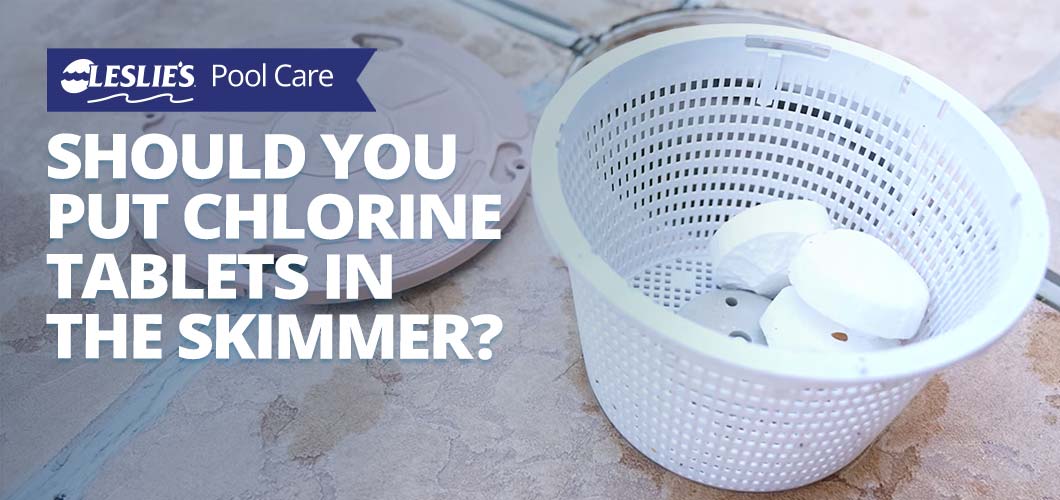
Should You Put Chlorine Tablets in the Skimmer?
Chlorine tablets are a staple for many pool owners, serving as a convenient way to maintain proper sanitization levels in your swimming pool. However, there's a common misconception about where these tablets should be placed. While it may seem convenient to toss them into the skimmer basket, doing so can lead to a host of problems that could ultimately damage your pool and equipment. In this article, we'll delve into why putting chlorine tablets in your skimmer is a bad idea, and explore the best alternatives for effective pool maintenance.
Problems Caused by Putting Chlorine Tablets in the Skimmer
One of the primary reasons why you shouldn’t place chlorine tablets in your skimmer is because of the adverse effects it can have on water chemistry and equipment. Chlorine tablets, specifically trichlor tablets, are designed to dissolve slowly when submerged in water. However, when placed in the skimmer basket, they are subjected to increased water flow, causing them to dissolve faster than intended.
This increased rate of dissolution means the chlorine level can drop much faster than expected, which can lead to a higher risk of algae growth and unsanitary water. Not to mention, the faster your chlorine dissolves, the more often you’ll need to replenish the supply, which can get extremely expensive.
Additionally, when the pump stops running, the tablets remain in the skimmer basket, where they are left to dissolve in still water. This can cause the pH levels to plummet, turning the water acidic. Acidic water can lead to a host of problems, such as the corrosion of the skimmer and surrounding equipment, which leads us to our next point.
Potential Damage to Equipment
The damage caused by placing chlorine tablets in the skimmer extends far beyond water chemistry issues. Once your pump turns on again, the superchlorinated, acidic water gets sucked into your equipment, corroding metal components and degrading plastic and rubber parts in your pool equipment. This includes your pump, filter, heater, and any other components that come into contact with the chemically imbalanced water.
Furthermore, the gasses released by the acidic water can weaken the skimmer lid, making it prone to breakage. This not only leads to the need to replace the skimmer lid, but also poses a serious injury risk if someone were to step on and fall through a weakened or broken skimmer lid. Ultimately, the damage caused by improper chemical placement can void equipment warranties, leaving you with additional expenses and headaches down the line.
Alternative Solutions for Chlorine Dispensing
To avoid the stressful and costly results of placing chlorine tablets in the skimmer, let’s explore preferred methods of dispensing pool chemicals. One popular option is to use a floating chlorine dispenser, which releases chlorine gradually into the water as it floats around the pool. These dispensers are affordable, easy to use, and operate continuously, providing consistent sanitization without the risk of equipment damage.
Another option is to invest in an inline or offline automatic chlorine dispenser, which offer more precise control over chlorination levels and better distribution of chlorine throughout the pool. While these systems may require plumbing modifications for installation, they offer greater convenience and efficiency in maintaining water quality.
Safety Precautions and Best Practices
Regardless of the method you choose for chlorine dispensing, it's crucial to prioritize safety and comply with product instructions. Carefully read and follow the label instructions provided with pool chemicals to avoid unintended consequences and potential damage to your pool and equipment.
For example, Leslie's 3-inch Jumbo Tabs explicitly warns against placing them in the skimmer. Ignoring these warnings can result in expensive repairs, equipment damage, and an unsafe pool area. By following best practices and using appropriate dispensing methods, you can ensure the long-term health and enjoyment of your pool, while minimizing the risk of damage and complications.
While it may be tempting to toss chlorine tablets into the skimmer for convenience, doing so can have serious repercussions for your pool and equipment. From fluctuating chlorine levels to corrosive water chemistry, and equipment damage, the pitfalls of skimmer placement far outweigh any perceived benefits. Instead, opt for alternative chlorine dispensing methods, such as floating dispensers or automatic chlorinators, to maintain proper sanitization without risking damage to your pool. Remember to prioritize safety and follow manufacturer instructions to protect your pool's health and longevity.
No matter what you need for your pool, you can count on Leslie’s to have the products and expertise to help you get the job done right the first time! For more information on pool care and equipment maintenance, check out our Resource Center, visit our YouTube channel, or stop by your local Leslie’s and speak with one of our experts.